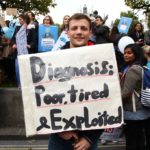 It’s well known that beginning your career in an economic recession can have a profound and lasting impact upon your entire career. New research from the University of Michigan highlights how political disruption affects the careers of first-year doctors.
It’s well known that beginning your career in an economic recession can have a profound and lasting impact upon your entire career. New research from the University of Michigan highlights how political disruption affects the careers of first-year doctors.
The researchers assessed the performance of junior doctors alongside any major political and non-political events. The study found that political events in particular had a pronounced effect on the mood of the young doctors.
The researchers gathered data on intern health from an existing and ongoing study, with the data already highlighting the risk of depression among junior doctors, together with a strong connection between stress and the mental wellbeing of the doctors.
The data contained daily mood ratings from a few thousand junior doctors during 2016 to 2018, with the researchers particularly interested in changes in the wake of major national and global events. Three events appeared to have the biggest impact: the 2016 presidential election, the 2017 presidential inauguration, and the failure of the spending bill to finance a border wall with Mexico.
Political engagement
The 2016 election was strongly associated with a drop in mood, with the decline even greater than in the first weeks of intensive training undertaken by the group. Similarly, the 2017 inauguration was also associated with a strong fall in mood, whilst the failure of the bill to finance the border wall corresponded with a boost in mood.
Indeed, the decline in mood immediately after the election was four times greater than that recorded on any other day, with the decline among female doctors roughly twice that of male doctors. What was perhaps most interesting is that it only appeared to be political events that affected the mood of doctors, with events ranging from natural disasters to mass shootings having no such impact.
“This suggests to us that interns were deeply engaged with and affected by the election, even while facing the incredible demands of their intern year,” the authors say. “It also suggests that the 2016 election was experienced as deeply personal and distressing for many young women in medicine.”
Greater awareness
The results suggest that modern physicians are more politically engaged than previous generations. There is also the possibility, however, that the results simply reflect the changing demographics of the profession, with more women, people of color and those from a variety of socioeconomic backgrounds more represented than before.
What remains less certain is whether the growing diversity of the profession, and the range of political views this brings, will translate into greater political involvement and activism among the profession. It has traditionally been the case that physicians have tried to remain neutral on political matters so as not to impact their relationship with patients.
“There has always been a vigorous debate in medicine on whether physicians should engage in politics and to what extent,” the researchers say. “These data suggest deep engagement is happening in young doctors during even their most intense clinical workload.”
In a more immediate sense, it provides a salient reminder that doctors are not immune from political interests, and just as research has shown a decline in mood after political defeats in other avenues of work, so doctors are not immune either.